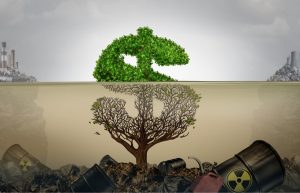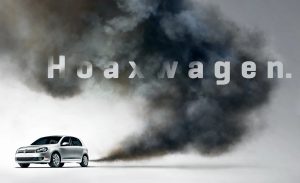When enrolling in COMM 484, one thing I was always curious about was learning how companies can avoid “Greenwashing”. We hear stories all the time of misleading labels and marketing efforts undertaken by companies hoping to cheat their way into becoming more sustainable, but it was actually in my capstone course where I learned of one moment that particularly stuck with me. It’s largely considered the worst example of Greenwashing the world has ever seen, and it even became a Harvard Business School case we had to study. The name of the case and controversy was called ‘Dieselgate’.
Greenwashing refers to “the act of providing the public or investors misleading or outright false information about the environmental impact of a company’s products and operations” (Investopedia).  This can range from simple examples such as when Starbucks released straw-less lids to reduce waste, only to use even more plastic than before, all the way to deliberately lying and cheating to achieve sustainability goals. In 2015, the EPA discovered that Volkswagen had been cheating their emissions tests of their new Diesel cars that emitted over 40 times the legal limit of nitrogen oxide pollutants and violated the Clean Air Act. Prior to this bombshell, Volkswagen had boasted about its low emissions and eco-friendly features compared to alternatives.
This can range from simple examples such as when Starbucks released straw-less lids to reduce waste, only to use even more plastic than before, all the way to deliberately lying and cheating to achieve sustainability goals. In 2015, the EPA discovered that Volkswagen had been cheating their emissions tests of their new Diesel cars that emitted over 40 times the legal limit of nitrogen oxide pollutants and violated the Clean Air Act. Prior to this bombshell, Volkswagen had boasted about its low emissions and eco-friendly features compared to alternatives.

As they later admitted, they had regularly installed vehicles with defect devices that could give false ratings during certain tests and show extremely low total emissions levels. Specifically, they had intentionally programmed turbocharged direct injection (TDI) within diesel engines to only activate emissions control during testing. Of course, these ratings were complete and utter lies, as in reality outside of testing environments, the devices were not installed. As a result of the scandal, Volkswagen had to recall a whopping 8.5 million of their cars mostly in the United States, their CEO Michael Horn was pressured into resigning, their shares plummeted, and for the first time in 15 years they suffered a quarterly loss.
The aftermath of this incident was severe. Not only did Volkswagen have to spend over $10 billion to buy back the defunct vehicles, but they had destroyed the trust of their loyal customers. Greenwashing simply isn’t worth it in the long run, as customers and investors are demanding transparency. Although this is an extreme example, it proves this issue certainly exists in the corporate world and we should always pay close attention.
Sources:
https://www.bbc.com/news/business-34324772
https://www.epa.gov/vw/learn-about-volkswagen-violations
https://www.investopedia.com/terms/g/greenwashing.asp
https://www.lexology.com/library/detail.aspx?g=2244637f-89b4-49d1-86a4-0d7d74ae3b19
https://www.theguardian.com/business/2018/jul/23/starbucks-straws-ban-2020-environment